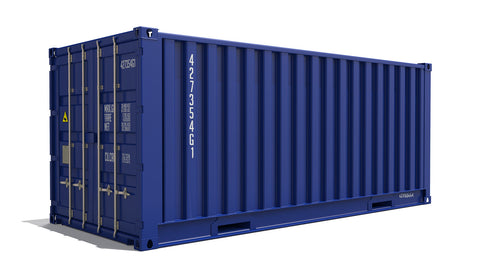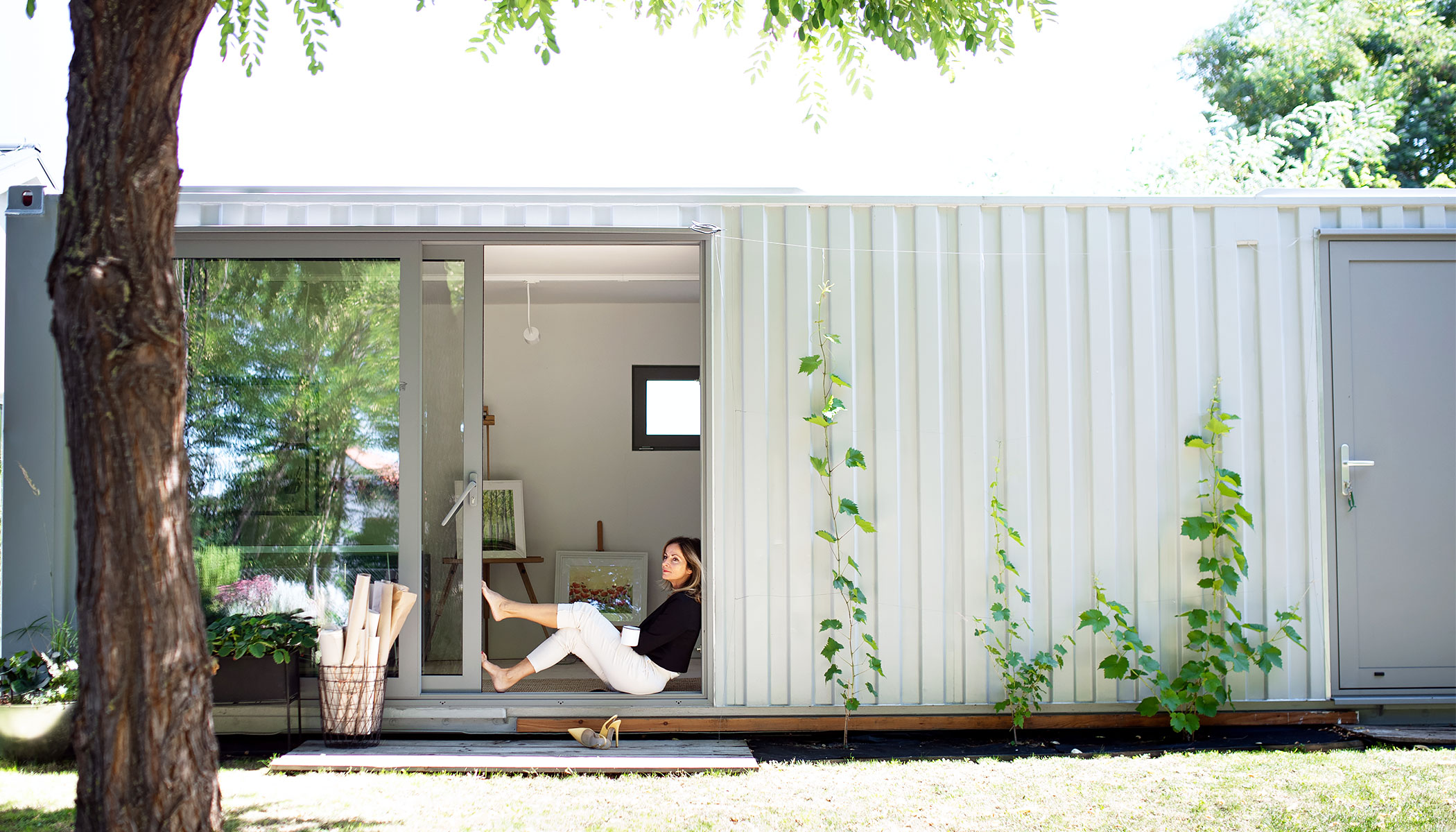Whatever You Need to Understand About Shipping Containers and Their Practical Applications
Shipping containers have advanced from simple devices for transport to flexible structures with various functional applications. Their durable design and standard sizing make them optimal for a series of usages beyond shipping. From ingenious real estate options to sustainable farming, their flexibility is noteworthy. Yet, the opportunities do not finish there. Discovering their various features discloses surprising understandings into imaginative solutions and modern-day difficulties. What various other functions could these containers play in today's globe?
The Design and Structure of Shipping Containers

Internally, containers are created to make best use of room, usually including wooden or steel flooring that can sustain substantial weight. Air flow systems may be included to avoid dampness build-up, which is crucial for sensitive cargo. Additionally, reinforced corners enable very easy handling by cranes and forklifts, assisting in seamless loading and dumping. This thoughtful style and framework contribute to the containers' flexibility across various shipping and storage space applications.
Advantages of Utilizing Shipping Containers
While several transport approaches have their advantages, the usage of delivery containers stands apart as a result of their unequaled flexibility and effectiveness. Shipping containers use a standardized dimension, making them very easy to carry and pile throughout different settings of transport, consisting of trains, trucks, and ships. This standardization reduces filling and unloading times, consequently raising total efficiency.
Additionally, delivering containers are built from resilient products, supplying durable defense for items throughout transit. They are safe and secure and weather-resistant, decreasing the danger of damages from ecological variables or burglary. Furthermore, the modular layout of shipping containers enables very easy customization, enabling organizations to adapt them for different objectives, such as storage or mobile workplaces.
Ultimately, their portability and cost-effectiveness make shipping containers an eye-catching alternative for companies wanting to simplify logistics and supply chain procedures. These benefits add to the growing appeal of shipping containers in various industries.
Creative Housing Solutions With Shipping Containers
Cutting-edge real estate options have become an amazing application of delivery containers, leveraging their intrinsic staminas for property use. These versatile structures provide a sustainable option to traditional structure materials, typically at a portion of the price. Developers and architects have transformed containers right into stylish, useful homes, providing to diverse way of lives and preferences.
Shipping containers are ecologically friendly, advertising recycling and decreasing waste. Many projects concentrate on power effectiveness, incorporating solar panels and green roof coverings. As urbanization rises, these ingenious housing remedies offer a practical reaction to housing lacks while fostering a special building visual.
Shipping Containers in Retail and Pop-Up Shops
A growing number of retailers are transforming to delivering containers as a vibrant remedy for pop-up shops and retail rooms. These versatile frameworks provide an economical option to standard shops, allowing organizations to create distinct, eye-catching environments that draw in consumers. Their modular design enables simple transportation and setup, making them optimal for short-lived or seasonal retail areas.
Sellers can personalize delivery containers to show their brand name identification, changing them into visually appealing stores that stick out in congested markets. The portable nature of containers additionally motivates efficient use area, enabling creative layouts that enhance consumer flow and interaction. Moreover, delivering containers can be positioned in unique locations, such as city parks or vacant great deals, increasing ease of access and foot website traffic.
As the retail landscape progresses, delivering containers give a versatile and innovative option that satisfies the needs of modern consumers while enhancing the buying experience.
Lasting Farming Practices Utilizing Shipping Containers
Sustainable farming practices increasingly incorporate shipping containers as ingenious options for farming - sea can for sale. These container ranches utilize hydroponics to maximize area and source efficiency, using an affordable technique to food manufacturing. By changing delivery containers right into agricultural centers, farmers can address food protection and ecological issues all at once
Container Farming Benefits
While conventional farming deals with obstacles such as land deficiency and climate modification, container farming presents a practical choice that maximizes room and sources. This cutting-edge technique enables year-round plant manufacturing in regulated atmospheres, minimizing reliance on weather. Container farms make use of much less water than conventional farming, promoting sustainability and preservation. They can be established in city areas, bringing fresh produce closer to customers and decreasing transport discharges. Additionally, the modular nature of delivery containers makes it possible for scalability, allowing farmers to readjust procedures based upon demand. Container farming also decreases pesticide usage by creating an enclosed environment, eventually improving food safety and security. As metropolitan populaces grow, container farming arises as a useful option to fulfill the boosting demand for neighborhood, sustainable food sources.
Hydroponics in Containers
Hydroponics, which allows plants to grow without dirt by making use of nutrient-rich water, grows within the boundaries of shipping containers, making it a perfect method for metropolitan agriculture. These containers create a regulated environment that maximizes light, humidity, and temperature level, making it possible for year-round farming. With minimal room in city locations, shipping containers provide a scalable option for expanding fresh produce. Hydroponic systems within containers can include different strategies, such as nutrient film method (NFT) and deep water society (DWC), which optimize yield look at more info while reducing water use. This cutting-edge technique not only improves food security however also reduces the carbon impact connected with standard farming techniques. Consequently, hydroponics in containers stands for a forward-thinking remedy for lasting urban food manufacturing.
Cost-Effective Agriculture Solutions
As food manufacturing deals with raising difficulties due to climate modification and urbanization, shipping containers emerge as a cost-efficient service for farming. These versatile structures can be repurposed for different sustainable farming methods, such as hydroponics and upright farming. By utilizing regulated environments within containers, like this farmers can maximize growth cycles and lower source intake, consisting of water and plant foods. Furthermore, delivering containers can be tactically placed in urban areas, reducing transportation prices and improving accessibility to fresh produce. Their modular nature permits scalability, making it possible for farmers to broaden procedures as demand expands. Repurposing containers contributes to waste reduction, lining up with eco-friendly farming campaigns. On the whole, shipping containers present cutting-edge opportunities for lasting and reliable food manufacturing.
Emergency Situation and Calamity Alleviation Applications of Shipping Containers

Organizations frequently use shipping containers to create mobile centers or field medical facilities, ensuring that treatment reaches those in demand. In addition, they can be transformed into command facilities for coordinating rescue operations, thereby improving business efficiency throughout situations.
Containers can be modified to keep important goods such as clothing, water, and food, guarding materials until they are distributed. Their movement permits them to be conveniently delivered to various places, making certain that aid arrives where it is most urgently required. In general, delivery containers play an essential duty in improving the performance of disaster relief efforts worldwide.
Frequently Asked Inquiries
Just How Are Shipping Containers Transported From One Area to One More?
Shipping containers are moved through trains, vehicles, and ships, utilizing cranes for filling and discharging. This multi-modal transport system ensures reliable movement throughout land and sea, linking international supply chains and facilitating international trade.
What Is the Average Life-span of a Shipping Container?
The ordinary life expectancy of a shipping container generally ranges from 10 to 25 years, depending upon upkeep, usage, and environmental factors. Proper care can extend their use, while disregard may result in wear and tear and damage.
Can Shipping Containers Be Changed for Various Usages?
Yes, shipping containers can be changed for different usages. They function as homes, workplaces, pop-up shops, and storage space systems. Their convenience enables creative adaptations, making them appropriate for a large variety of applications.
Are Shipping Containers Eco-friendly?
Shipping containers can be eco pleasant, as they promote recycling and repurposing. Their durability minimizes waste, while their use in alternate real estate and organizations lessens the demand for new products, adding to sustainable practices.
How Do I Select the Right Dimension Shipping Container?
To pick the appropriate size shipping container, one must evaluate storage space requirements, consider the intended usage, and examine space availability - sea can for sale. Typical dimensions include 40-foot and 20-foot containers, each offering various storage space and transport needs efficiently
Ingenious housing remedies have emerged as an interesting application of delivery containers, leveraging their fundamental toughness for household usage. The flexibility of shipping containers allows for innovative formats, from single-unit residences to complicated multi-container plans. Sustainable farming methods significantly integrate shipping containers as ingenious remedies for farming. Additionally, the modular nature of delivery containers allows scalability, allowing farmers to adjust procedures based on demand. Hydroponics, which enables plants to grow without dirt by utilizing Continued nutrient-rich water, grows within the confines of shipping containers, making it a suitable method for metropolitan agriculture.